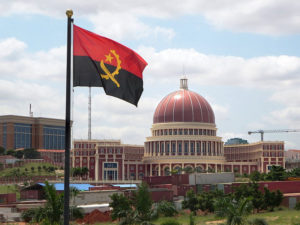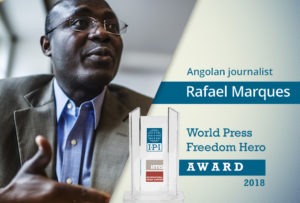
Angola National Assembly Building. Wikipedia.
The son of Angola’s former president Jose Eduardo dos Santos has been remanded in custody in a $1.5bn corruption case. Those targeted include the ex-president’s son, Jose Filomeno dos Santos, former head of Angola’s sovereign fund, AP reports.
In 2013, the Sovereign Wealth Fund Institute ranked dos Santos number 26 out of the top 100 wealth fund chiefs in the world, one in “a new round of leaders managing sub-Saharan Africa’s sovereign wealth,” the Organized Crime and Corruption Reporting Project (OCCRP) adds.
Angola’s President Joao Lourenco has pledged to fight corruption and rebuild the economy of the second-largest oil producer in sub-Saharan Africa, which has still not recovered from the plunge in oil prices in 2014, AFP adds:
He has ousted relatives of his predecessor, dos Santos, from leadership positions at institutions and public companies in a move to boost transparency. But his removal of dos Santos’ daughter Isabel from the top job at national oil giant Sonangol raised fears that Sonangol could withdraw its stakes in Portugal’s energy company Galp or the BCP bank.
 Nevertheless, “the Portuguese and Angolan governments are still complicit in the looting of Angola,” said investigative journalist Rafael Marques de Morais of the NGO Maka Angola and a recipient of the National Endowment for Democracy’s 2017 Democracy Award.
Nevertheless, “the Portuguese and Angolan governments are still complicit in the looting of Angola,” said investigative journalist Rafael Marques de Morais of the NGO Maka Angola and a recipient of the National Endowment for Democracy’s 2017 Democracy Award.
“With Lourenco as president, it is to be hoped that these relations will enable them to collaborate in the repatriation of the funds stolen in Angola and placed in Portugal, by Angolans as well as by Portuguese,” he told AFP.
Many other members of Angolan civil society share his skepticism. Human rights lawyer Zola Bambi fears that Lourenco might be tempted to replace the so-called “dos Santos kleptocracy” with a new one of his own making, Deutsche Welle reports.
 “Our constitutional system transfers too much power to the executive, that is, the president and his government,” Bambi told DW. “In Angola, the president is almost on the same level as an emperor.” Bambi believes there is a very real danger that Lourenco will employ the same methods of governance as his predecessor did.
“Our constitutional system transfers too much power to the executive, that is, the president and his government,” Bambi told DW. “In Angola, the president is almost on the same level as an emperor.” Bambi believes there is a very real danger that Lourenco will employ the same methods of governance as his predecessor did.
Corruption has continued to undermine Angola’s economy while the new government has taken only tentative steps to open up an authoritarian political climate, experts said. It is far from clear whether Mr. Lourenço’s government has gone after his predecessor’s children to clean up the economy or simply to grab their assets, The New York Times adds:
 “Whether the new president will wage a fair, deep and prolonged fight against corruption remains to be seen,” said Fernando Macedo, a political scientist who has taught at Lusíada University in Luanda, the Angolan capital. So far, Mr. Macedo said, the new government has carried out easy changes, including liberalizing the state news media and allowing political demonstrations.
“Whether the new president will wage a fair, deep and prolonged fight against corruption remains to be seen,” said Fernando Macedo, a political scientist who has taught at Lusíada University in Luanda, the Angolan capital. So far, Mr. Macedo said, the new government has carried out easy changes, including liberalizing the state news media and allowing political demonstrations.
Angola – an “oil-soaked kleptocracy” by some estimates -is ranked 167 out of 180 countries in Transparency International’s 2017 Corruption Perceptions Index, receiving a score of 19 out of 100, with 0 being the most corrupt. The average score in sub-Saharan Africa is 32.







